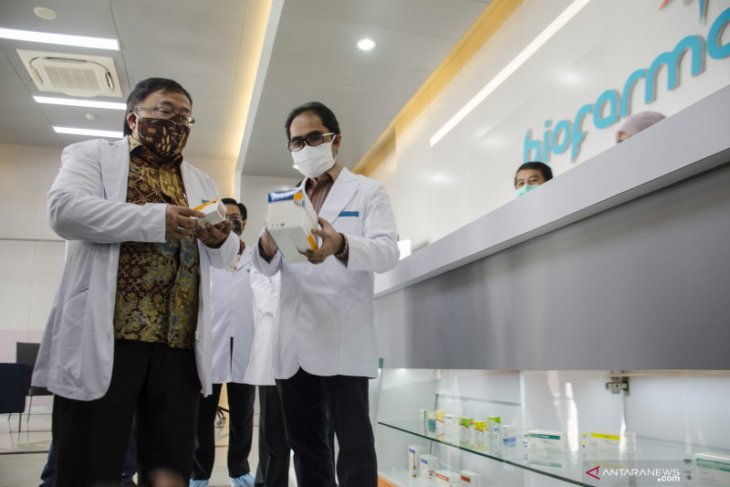Live Streaming
Program Highlight
Company Profile
Universities Encouraged to Contribute to National Industry Development
Written by Ani Hasanah
Minister of Research and Technology/Head of the Indonesian National Innovation Research Agency Bambang Brodjonegoro (left) speaks with Bio Farma President Director Honesti Basyir (right) during a working visit to Bio Farma, Bandung, West Java, Wednesday (29/7/2020). ANTARA / Novrian Arbi
Minister of Research and Technology/National Research and Innovation Agency (BRIN) Head Bambang P. S. Brodjonegoro encouraged universities to contribute to development of the national industry through research, development, assessment, and application activities.
"Innovation can be conducted at every stage of R&D (research, development, assessment, and application) to produce superior innovative products. A paradigm shift is necessary from all lines to become an 'innovation-based economy' (an innovation-based country)," Brodjonegoro noted in a written statement received by ANTARA in Jakarta, Friday.
Brodjonegoro remarked that Indonesia envisions becoming a high-income developed nation by 2045 when it celebrates 100 years of independence.
During a virtual seminar themed “Advanced Indonesia Based on National Research and Innovation: The Role of Higher Education in National Industrial Development” organized by Telkom University on August 5, 2020, Brodjonegoro highlighted the need for a breakthrough through innovation to become a developed country.
Minister Brodjonegoro stated that the manufacturing sector remains at the forefront for boosting national economic growth. Hence, for development of the manufacturing industry, a breakthrough is necessary to boost competitiveness based on innovation.
Emphasis on policy programs and policy instruments, such as incentive funds for the Ministry of Research and Technology (Kemristek)/BRIN in the next five years, will lead to the implementation of a "triple helix" of academicians-business-government that in essence is a synergy between universities, ministries and institutions, industry, and government.
The minister noted that research and innovation entails a new mindset, behavior, culture, and way of working. These three can be covered in research-based learning and innovation.
"Triple helix" synergies in COVID-19 prevention comprise involving a consortium of research and innovation, including various non-ministerial research institutions (LPNK), universities, industry, Ministry of Health, Ministry of SMEs, Ministry of Industry, and the private sector synergizing together in the direction of the Ministry of Research and Technology/BRIN.
Thus, in a short span of time, several innovative products can be manufactured, including PCR test kits, rapid tests, autonomous UVC mobile robots, convalescence serum, artificial intelligence systems for COVID-19 detection, immunomodulators, mobile Lab BSL-2, ventilators, and powered air-purifying respirators.
Brodjonegoro affirmed that the present and future changes in several fields during the post-COVID-19 era will change the economic paradigm that will adapt to new habits and regulations in the fields of technology migrating to contactless, human behavior in the context of immune certifications, industrial dynamics, geopolitics, regulations pertaining to new privacy laws, and macroeconomics within the context of limited access to capital.
Furthermore, the minister pointed to 10 technological trends during the COVID-19 pandemic: online shopping and entertainment, digital payments, supply chain 4.0, work-from-home or teleworking, 3D printing, telemedicine, robots and drones, online education and training or tele-education and training, as well as 5G technology and information communication technology, all of which will lead to economic digitization. (ANTARA)



